Leading change
Unisa takes its place in the sun
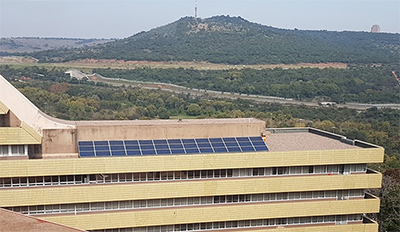
OR Tambo Building rooftop solar farm for the e-garden
Academics are usually accused of remaining theoretical in what they do. This is, however, not the case for Prof Godwell Nhamo, the incumbent of the Exxaro Chair in Business and Climate Change at Unisa. The chair is hosted by the Institute for Corporate Citizenship (ICC) under the College of Economic and Management Sciences (CEMS) and Nhamo has been directing the chair since August 2009.
He can look back to 2012 and smile as his dream to have Unisa consider environmental and sustainability issues at the same level as progressive corporate entities is being fast realised, thanks to a willing and supportive Unisa management. One such noticeable achievement is Unisa’s scaling up of solar energy uptake that is changing the physical landscape of Unisa campuses.
At the time of writing, the RR Maluleka Building was already running on solar, with the Unisa Lenasia and the School of Business Leadership (SBL) campuses solar projects well under installation. Drawing from the information provided by the University Estates, the next solar projects will be put up at the AJH van der Walt and Kgorong buildings. These are no small achievements for corporate Unisa given the greener and low carbon world and South Africa we live in. Certainly, Unisa is a change agent and pathfinder in South African higher education in as far as this is concerned.
A coordinated green economy and sustainability engagement agenda for Unisa
According to Nhamo, the solar energy journey started with a vision in September 2012 that he documented for the Unisa Management Committee (ManCom) entitled the Green Economy and Sustainability Engagement Model (GESEM). The vision proposed the roadmap that was approved by ManCom on 22 January 2013.
GESEM responded directly to many ad hoc initiatives taking place within Unisa both from the administrative and academic perspectives aimed at addressing issues pertaining to the green economy, sustainable development, poverty eradication, and jobs creation in line with the South Africa’s National Development Plan Vision 2030. However, these commendable ad hoc activities lacked a coherent strategy and were therefore uncoordinated. Continuing on this path had the potential to reverse the gains made or to leave some areas unattended to in terms of what needed to be addressed to realise the full potential of a coordinated green economy and sustainability engagement agenda for Unisa.
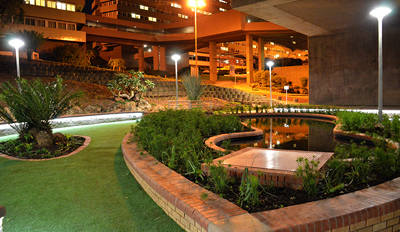 |
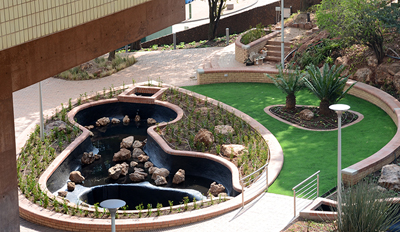 |
Although initiated by the Exxaro Chair, GESEM became one of the flagship projects to be championed through the Principal and Vice-Chancellor’s Office and the Vice-Principal: Advisory and Assurance Services, and directed by Nhamo, who worked closely with other current and former staff members, especially from University Estates.
From Nhamo’s view, GESEM was his medium- to long-term in-reach community engagement programme for Unisa. To this end, GESEM proposed a number of thematic focus areas that included the Green economy and sustainability policy development and incubation; Energy and carbon management (focus of this article); Waste, pollution, water and biodiversity; Reporting and external liaison; and Records, procedures, and awareness.
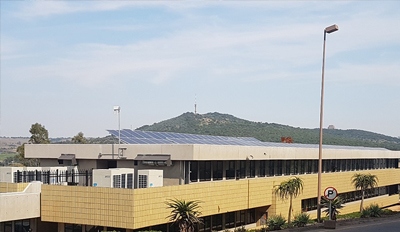
RR Maluleka Building rooftop solar farm
Some of the noticeable planned initiatives under the green economy and sustainability policy development and incubation thematic focus area included the refinement of the existing Environmental Sustainability Policy; developing a baseline for the Unisa Carbon Footprint; developing the Energy and Carbon Policy; developing the Pollution and Waste Policy; developing the Water and Biodiversity Policy; ongoing inputs towards the refinement of the Environmental Risk Register; inputs towards the refinement and/or development of the Green Procurement Policy; and inputs towards the refinement of the Unisa Living Green Initiative.
To facilitate the smooth implementation of GESEM, ManCom agreed that, in the short term, existing institutions and staff would be utilised as deemed fit. In the event that existing intuitions and staff might be inadequate, outsourcing and contracting could be other alternatives. Only one shared secondment post was then created for the Deputy Director in the Risk Directorate.
Energy and carbon management
To put GESEM to test, Nhamo took it upon himself to draft the Energy and Carbon Policy and sought outside top-up funding for the development of the Unisa Energy Master Plan. The Unisa Energy Master Plan was finalised in 2015 with the top up funding from the National Business Initiative’s Private Sector Energy Efficiency Programme, with the Energy and Carbon Policy approved by the Unisa Council on 15 September 2016. The approval of the Energy and Carbon Policy followed three years of consultations both within and outside Unisa. Both the Energy Master Plan and the Energy and Carbon Policy embrace perspectives from eight focus areas, namely: management system requirement, energy planning, energy efficiency, renewable energy, carbon management, green procurement, and competence and training.
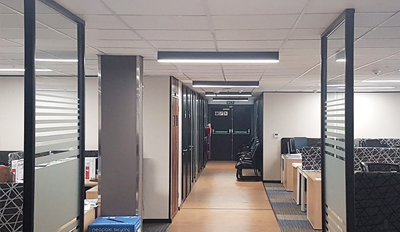
All-solar lighting inside RR Maluleka Building
This Energy and Carbon Policy is part of the Unisa Energy Master Plan. It gives effect to the three pillars constituting the Energy Master Plan, namely, the Energy Efficiency Action Plan, Carbon Management Action Plan, and the Alternative Energy Action Plan. Solar energy is addressed in the Alternative Energy Action Plan.
Reflecting on all that has transpired to date, and the amount of work done, Nhamo had this to say: “I wish to thank the Unisa management, especially Professor Mandla Makhanya, for sharing the vision presented in GESEM.
“In fact, going solar makes cents. It is not common knowledge that Eskom charges Unisa and its other customers close to double the rates per kWh in winter.
“I also wish to thank all the other key stakeholders, which include University Estates, the Sustainability Office, Exxaro Resources Limited, which sponsors the Exxaro Chair, the CEMS Deanery, and all colleagues in the Institute for Corporate Citizenship.”
As for the visuals, in the photographs are shown completed solar projects at Unisa main campus in Muckleneuk, Pretoria. These include the RR Maluleka and OR Tambo buildings projects. The RR Maluleka solar project put the entire building off grid for non-industrial energy consumption, while the OR Tambo solar project powers the e-garden.
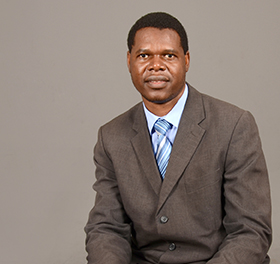
Prof Godwell Nhamo (Incumbent: Exxaro Chair in Business and Climate Change, and driver of GESEM at Unisa)
*By Godwell Nhamo
Publish date: 2018/05/04